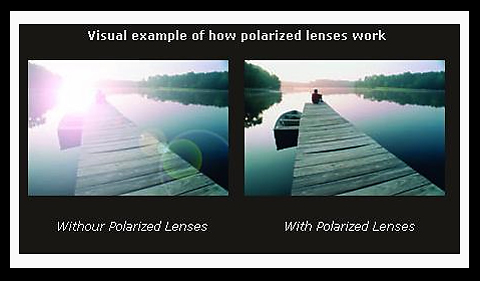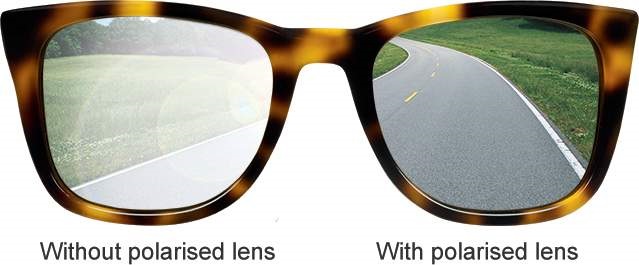Go to an optical store or look online, you’ll probably come across the term ‘polarized’ very frequently. In fact, you’ve probably come across the term even in contexts that have nothing to do with eyeglasses or sunglasses. So what exactly is polarization? Is it actually needed? Is it worth the cost? Is it viable in all situations? We answer all your questions about this particular type of lens!
So before we dive into what polarized lenses are and how they work, we need to understand about how sunlight splits when it reaches the earth. Ever wondered about why you’re not able to see under clear water in the sunlight? Why sometimes it’s just too bright to see anything around you? Why something headlights seem to temporarily ‘blind’ you? All of these are examples of glare. Glare can be defined as the difficulty in vision observed because of excessively bright light. Now you might wonder, sunlight during the day isn’t ‘excessively’ bright, I’m not looking directly at the sun, then why can’t I still see properly? The answer, is because of scattering light.
When sunlight reaches the surface of the earth, it scatters and travels in many different directions. Broadly, we can term them as vertically polarized light and horizontally polarized light. Now, vertically polarized light helps us actually see things, but horizontally polarized light simply causes discomfort. Light reflected off of the surface of water, buildings, roads, glass panes, windows, snow and whatnot moves in a horizontal direction and enters into our eyes, and is excessively bright. This is why you sometimes feel blinded for a moment when a car passes by in the daylight, or if you’re near a water body.
Now, if you’re lounging on the beach or fishing, you might not be able to see what’s under the surface of clear water, and it’s not so dangerous, but while driving, skiing, playing sports or operating machinery, you need to concentrate at every single point of time. Imagine you’re water skiing at high speed, hanging on to your equipment and focused on the path ahead, and you’re suddenly blinded by light reflected off of a wave. Or imagine you’re driving down a highway with your family and a passing car’s windscreen blinds you for a moment at a turn. Both these situations could turn fatal if you take your eyes off even for a second. And these are the situations when you require polarized glasses.
Polarized glasses are glasses with specially made or coated lenses that block this harmful horizontally polarized light, which causes glare. Non polarized glasses simply let in all types of light without any filtration, which sometimes causes visual discomfort. Polarized glasses let in only vertically polarized light, which lets you easily see everything clearly, and filters out the horizontally polarized light which obstructs vision.
Originally developed to help fishermen see better, polarized glasses became popular after it was seen that they block the unwanted glare during sports, especially water sports, and driving as well. It’s a pretty neat effect, being able to clearly see the bottom of a container or pool during broad daylight, and you’ll understand the difference only when you try on a pair of polarized glasses.
So to summarize, polarized glasses offer the following advantages:
- Reduce eye strain
- Improve vision in daylight and certain conditions
- Improve contrast
- Allow you to see true colors
- Reduce glare and reflections

You’re probably wondering, why aren’t all lenses polarized then? Well, there’s a couple of reasons for that. The first is that clear lenses, by function, cannot be polarized. They have to be slightly dark or tinted, so eyeglasses can’t be polarized. Photochromic glasses, can be, however. Second, is that they are a little bit more expensive than your regular glasses. Third, and final, is that polarized glasses aren’t recommended in all situations. Polarized glasses work in such a way that anyone wearing them aren’t able to see LCD or LED screens properly. So if you’re in a vehicle that displays information in that way, or work in a place which has an abundance of screens, or simply need to check devices with screens frequently, polarized glasses can be a bit of a problem.
Otherwise, we definitely recommend polarized sunglasses for everyone, because glare and reflection free vision is the best kind! If you have any questions or doubts about the whole process and working, feel free to reach out to us.

